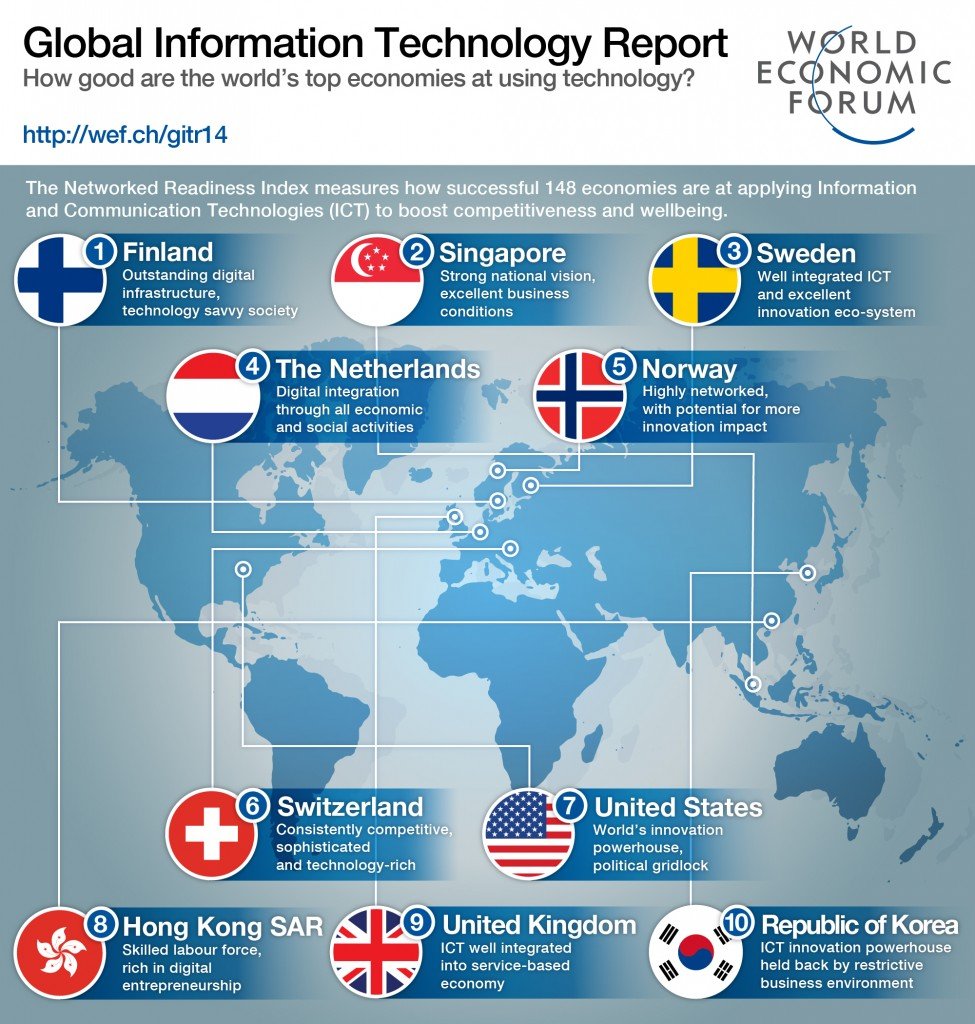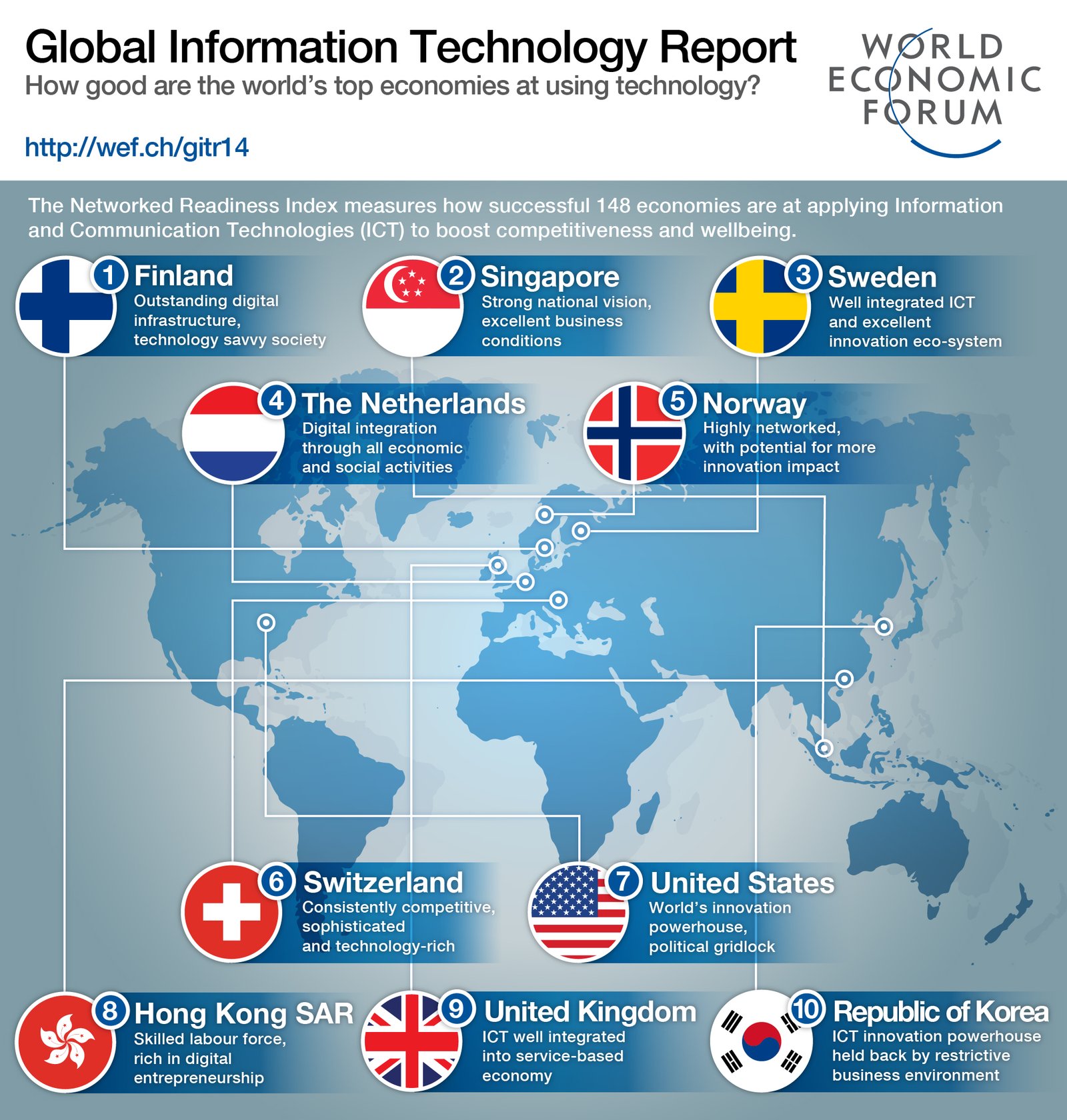INSEAD, the leading international business school, in partnership with the World Economic Forum and the Samuel Curtis Johnson Graduate School of Management at Cornell University, today released the findings of its latest annual technology survey, “The Global Information Technology Report 2014: Rewards and Risks of Big Data.”
The report indicates an alarming lack of progress in bridging the “digital divide” between emerging and developing nations and the world’s networked economies. The implications of this growing disparity suggest that less developed countries may miss out on many important benefits from information and communications technology (ICT).

Three GCC countries are ranked in the top 30 list globally for the third consecutive year, and another two in the top 40: Qatar (ranked 23), the United Arab Emirates (24), Bahrain (29), Kingdom of Saudi Arabia (32) and Oman (40). These countries have demonstrated continued effort to improve ICT uptake and better integrate ICTs in more robust innovation ecosystems in order to obtain higher returns.
In contrast, countries in the Levant and North Africa still lag behind and suffer from important weaknesses in their framework conditions and overall innovation capacity preventing them from fully leveraging ICTs and getting higher returns. Jordan moved up three to rank (44) ahead of Kuwait (72), Tunisia (87), Egypt (91), Lebanon (97), Morocco (99), Algeria (129), Libya (138) and Yemen (140).
“As in previous years, the MENA region depicts a highly diversified outlook in terms of the capacity of countries to leverage ICTs to boost competitiveness and well-being: Qatar remains stable at 23 while the UAE moved up one rank reaching 24, Bahrain also remains stable at 29, Saudi Arabia moves one down to 32, Oman remains stable at 40 and Jordan moves up three at 44”, said Bruno Lanvin, GITR co-author and Executive Director of INSEAD’s European Competitiveness Initiative (IECI) and Executive Director for Global Indices. “On the other hand Kuwait (72) lost ten places, Egypt lost eleven (91), Lebanon lost three (97) and Morocco lost ten (99).”
The United Arab Emirates continuesto advance in the rankings, this year by one position, to reach 24th. Currently, UAE ranks second in the Middle East, with Qatar leading by one place. Most notably, the UAE ranks in the top five on two sub-pillars – Government Usage (2) and Social Impact (5).
The UAE’s most significant strengths include Importance of ICTs to government’s vision (1), Mobile network coverage (1), ICT use & Government efficiency (2), Impact of ICTs on access to basic services (2), Government success in ICT promotion (2), Government procurement of advanced technology (3), Laws relating to ICTs (4), Firm-level technology absorption (4) and Impact of ICTs on new services & products (4). Its most significant weaknesses include Number of Procedures to Enforce a Contract (142), Internet & Telephony competition (126) and Fixed Broadband Internet tariffs (103).
“Improvements in the UAE’s ICT infrastructure and ICT uptake by individuals have led to greater economic impacts and thus a rise in the rankings. The government has a strong vision to develop ICTs as one of the key industries to diversify the local economy which is reflected in the already high and rapidly increasing levels of ICT uptake across all stakeholders”, said Miguel Lobo, Associate Professor of Decision Sciences, Director of the Abu Dhabi campus.
“The UAE benefits from a pro-business environment and also obtains fairly good economic impacts even though its technological innovation capacity remains low. Sustaining efforts to strengthen the UAE’s innovation ecosystem will be important in order to boost the potential results of a fairly well developed digital ecosystem”, added Lobo.
One of the report’s major findings is that countries need more than just ICT infrastructure development to increase their competitiveness. They also need a holistic strategy that creates an environment conducive for gaining the skills, innovation and entrepreneurship for people to flourish along with this modern infrastructure.
Given this insight, “digital strategies should not focus exclusively on developing ICT infrastructure, but also on creating the proper conditions for an effective use of ICT to boost innovation, competitiveness and higher social inclusion,” said GITR co-author Bruno Lanvin, the Executive Director of INSEAD’s European Competitiveness Initiative (IECI) and of the Global Indices projects at INSEAD.
First published 12 years ago, the GITR and NRI were designed to provide policymakers and investors with metrics to assess a rapidly evolving, yet still emerging, global technology landscape. Today, the report continues to deliver important insights about how the massive changes in technology over the past decade are shaping global markets and their potential. Among these changes has been the rise of Big Data. But while this tool holds great potential for business and society, the report’s experts say that it must be integrated within a knowledge environment that enables people to extract value from the data.
“Big data has the potential to infuse executive decisions with an unprecedented level of data-driven insights,” said Bahjat El-Darwiche, Partner, Strategy&, a sponsor of the GITR. To do so, though, it requires a robust knowledge infrastructure that enables critical thinking and analysis to thrive.
Reflecting on technological advances made over the last decade, Lanvin noted: “Business models have been redefined and the workplace redesigned, with start-ups evolving into large companies and many major social functions—including healthcare, education and privacy—being rethought.”
The report, like other studies, traces the connections between ICTs and economic development. With the NRI, the INSEAD-WEF-Cornell University analysis seeks to identify the complex and sometimes subtle ways that technology is transforming the economy and society. The researchers point out that despite the fact that ICTs are becoming increasingly universal, “the question of access and usage remains important—especially for developing countries, given their need to narrow the digital divide.”
This year’s findings indicate consistency among the top of the rankings: Finland (1), Singapore (2), Sweden (3), The Netherlands (4), Norway (5) and Switzerland (6) all retained their positions from the previous year. The United States moved up two places to 7th position, while Hong Kong (8) and the Republic of Korea (10) both move into the top 10. The United Kingdom, meanwhile, is the only nation in the top ranks to fall, sliding from 7 to 9 in the survey.
To read the full report and view the rankings, please go here.











